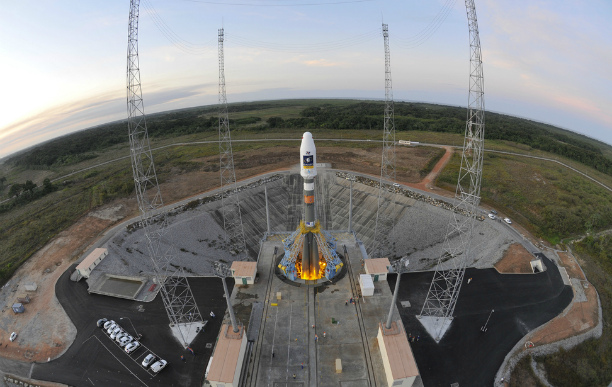Europe to Launch First Soyuz from South America
When a Soyuz lifts off from French Guiana on Thursday, it will be the first one to launch outside of Russia or Kazakhstan in the rocket’s 44-year history, and the first step in assembling Europe’s new GPS system.

The Soyuz ST-B awaiting its October 20 launch from the European Spaceport in French Guiana. Credit: ESA - S. Corvaja, 2011
This Thursday morning (Update: Launch was postponed to Friday due to a fueling problem) when a Soyuz rocket lifts off from French Guiana, it will mark a couple of important milestones: the first Soyuz to launch outside of Russia or Kazakhstan in the rocket’s 44-year history, and the first step in assembling Europe’s new Galileo satellite navigation system.
The French first built this launch facility near Kourou in 1964. The European Space Agency started funding the spaceport when the agency was created in 1974, and now uses the prime location — just five degrees north of the equator — for launching geostationary satellites. In 2003, the spaceport began construction of a launch site for the newest model of the Russian vehicle, a version of the Soyuz-2 called the Soyuz ST. Construction was completed in 2008 and, though not planned at this time, the pad can be adapted for human-rated Soyuz launchers, of the kind used to send cosmonauts and astronauts to the space station.
The three-stage Soyuz ST-B was lifted into vertical position on the launchpad last Friday, while the Arianespace team — which runs launch operations in French Guiana — went through full dress rehearsals to prepare for the launch tomorrow. You can see a slideshow of the launch preparations here.
The vehicle carries two Galileo In-Orbit Validation satellites, the first in Europe’s planned navigation system. These two testbed satellites will eventually be joined by about 30 fully operational spacecraft; the ESA and the European Union hope the system will be fully functional by 2014. Galileo is built to be even more accurate than the U.S. GPS (Global Positioning System), and will be freely available to civilians, giving European nations their own independent system.
You can watch the launch online at Arianespace’s good-looking new website that went live earlier this week.